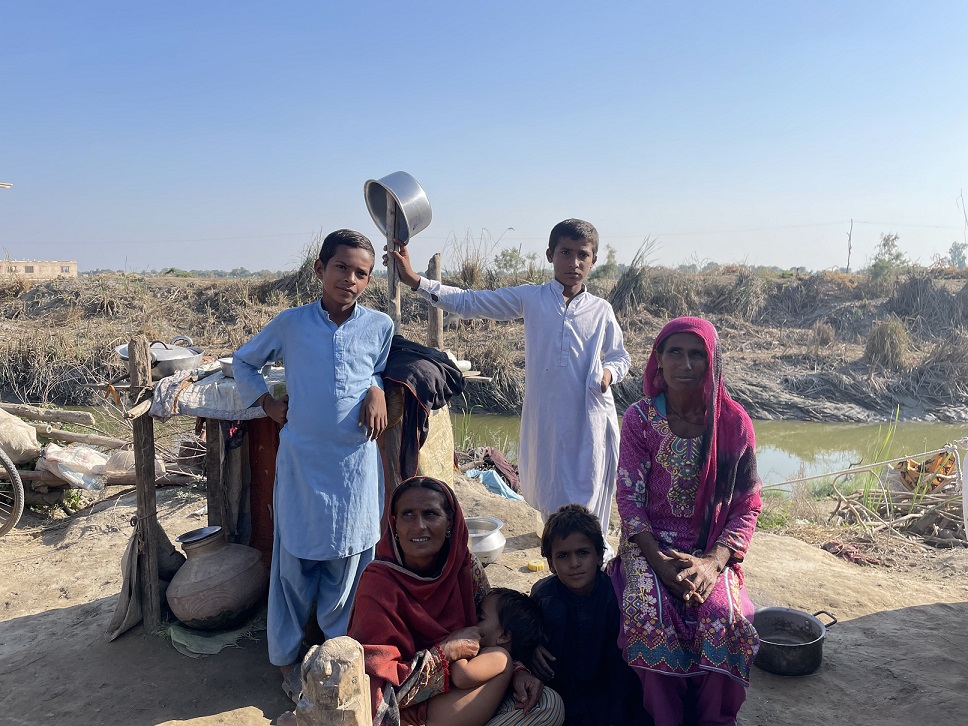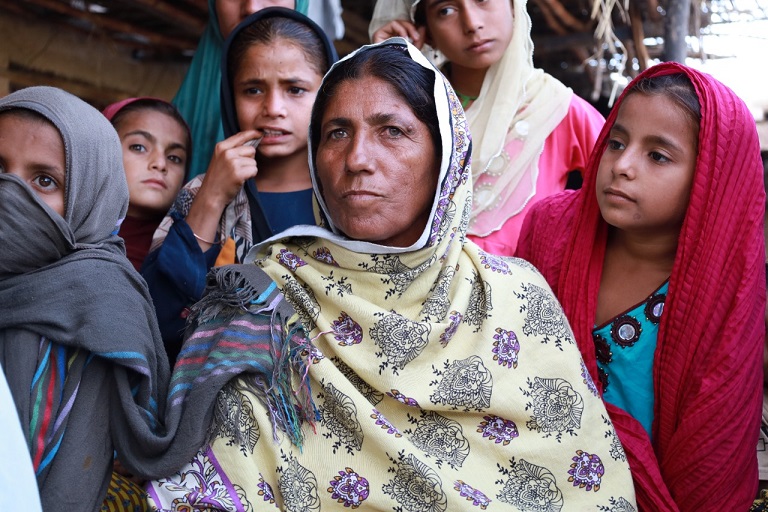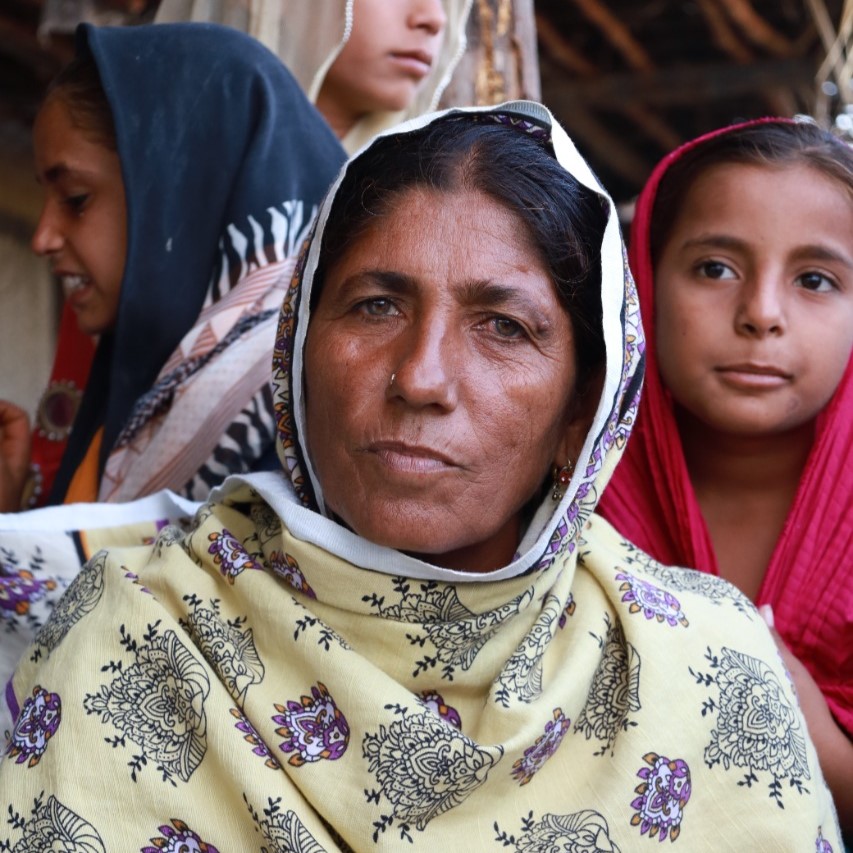For middle-aged Mai Jori and the people of her village, life came to a grinding halt in August this year.
It has been four months since the August floods, and her village is still swamped with stagnant water. The gushing floodwater wreaked havoc on schools, homes and agricultural land.
The rehabilitation of her flood-hit village — Goth Ghulam Muhammad Jamali, approximately four kilometres from Gandakha city, Jaffarabad, on the tail end of Balochistan — seems to be a far-off dream.
For as long as Mai Jori, 55, can remember, she has tended to rice and wheat fields. Livestock and crops have been primary sources of income for her people. Coming from a long lineage of women who were agricultural labourers, she was never formally educated. But when it comes to land and water, decades of lived knowledge has taught her that it is all political. “Since the start, [people in power] have tried to control water but water can’t be controlled by canals and dams.” She argues that to understand her area, one has to understand the politics of water and land.
Goth Ghulam Muhammad is located in the “Green Belt of Balochistan.” Its primary water supply is designed to come from Kirthar Canal, bringing water from the Indus River, but due to a larger history of poor mega-water infrastructures and irrigation systems, Kirthar is either completely dried year-round or overflowing with floods. Thus, the village either suffers from intense droughts or massive flooding.
Hafeez Ahmed Jamali, the Additional Secretary (Federal Projects) in the Government of Balochistan, explains that when it comes to land in the region there are hierarchies within hierarchies. To understand water and land politics in Jaffarabad, we need to look at the larger picture, he argues. “In our area, for historic reasons, the land of more powerful zameendars [landlords] is situated at the start, what we call the head, of the canal system; giving them more control over water. Jaffarabad is located at the tail-end of the canal system — where not much land is owned by the powerful, comparatively.
This geographical vulnerability, along with power concentration, leads to the tail-end’s exploitation.” However, not everyone at the tail-end suffers equally. Those in power continue exploitative practices, further marginalizing the poor to maintain their own economic and political power.
At first glance, Goth Ghulam Muhammad’s story is an ordinary tale of rural people and places who are made collateral damage in this epoch of climate change — a time shaped by histories of exploitative economic decision-making. But looking beyond its surface, this village shatters the mainstream image of a flood-affected area. The villagers believe that their history of rebellion, and geographical placement, is the reason behind their lack of access to aid and support from those in power. According to them, they took a stand against the Baloch Sardari (lordship) system and they are paying its price.
 A displaced family from Ghot Ghulam Muhammad now living across the village in tents.
A displaced family from Ghot Ghulam Muhammad now living across the village in tents.A bumpy, half-constructed road from Gandakha city, with parts of it still under water, leads to Goth Ghulam Muhammad’s entrance — which has a pool table on one side and a small convenience store on the other. In the afternoon, the area is packed with children playing made-up games, their laughter echoing past the destruction surrounding them.
According to the local people, the village population is approximately 4,000 people. Here, middle-class women are no longer agricultural labourers. They live in cement houses on elevated ground and have access to relatives in cities nearby. Among the poor, women are agricultural labourers, their houses sit right on the downward slope of the village, and they live in mud-houses with cemented roofs.
Before the floods, there were also a third kind of people in the village — the ones whose mud-huts were at the bottom of the slope — currently lying under approximately 10 feet of stagnant water. They can now be found in tents outside the village, overlooking the land which they once called home.
Pakistan’s Bureau of Statistics’ Mouza Census 2020 has highlighted that in Balochistan, 75 per cent of the housing structures, are mud made. Only one per cent are cemented. In August 2022, at the start of the floods, the Balochistan Provincial Disaster Management Authority estimated that at minimum approximately 81,000 were damaged — 61,718 partially and 20,000 completely. At the time, 145,936 livestock died and about 190,000 acres of agricultural land was ruined.
Agriculture Extension Director General Abdul Wahab Kakar estimates 98 billion rupees in losses to the agricultural sector.
Mai Jori’s house is a few feet away from the centre of the village. Surrounded by women and children, she sits on a wooden charpoy (string cot), next to a small brick stove. She has jet black hair (with the exception of a few grey strands), hazel-coloured almond-shaped eyes, and a stern face.
As she begins to talk about the floods, the noise around her fades. She points her index finger at the stagnant water nearby and says: “we are suffering today because we voted against those in power — the world doesn’t know the powerplay behind aid.”
Challenging the status quo
In 2010, Mai Jori contested a by-election on Balochistan Assembly’s PB-25 (Jaffarabad-1) vacant seat, as an independent candidate. However, she was financially supported and endorsed by the Awami Workers Party (a socialist political party which fights for “the rights of workers and all exploited peoples”). Unlike her competitors, she had no economic or political privileges such as land-holdings, education or feudal power. Her campaign wasn’t against one Sardar but rather the entire system. Though, she lost against late Mir Nasir Khan Jamali — a former provincial minister and a Sardar— she came in third place on a ballot with 15 other men.
Sardar Faisal Khan — Nasir Jamali’s brother — openheartedly accepts that Mai Jori’s election was against the local traditions. He says that Mir Nasir was contesting election on the seat which fell vacant due to the murder of his brother. “As per the local tradition, no one contests the by-election against the heirs of an elected public office-holder who dies during his tenure.” Nonetheless, during that by-poll Mai Jori and 14 other candidates were in the run, “but we didn’t try to stop or intimidate Mai Jori and any other candidate. She ran freely.”
While he agreed that Mai Jori’s accusation of revenge was correct, that politics of support and aid in the area are focused on voting, he says his family personally has not engaged in it and has dealt with matters fairly. “I have sent whatever aid I could to Goth Ghulam Muhammad and will continue to help people,” says Faisal.
When asked if any aid has made its way to Goth Ghulam Muhammad, Mai Jori hesitantly says yes, but adds that it was too little to cater to the problems of the people severally hit by the devasting flooding.
 Mai Jori sitting on a charpoy, surrounded by villagers
Mai Jori sitting on a charpoy, surrounded by villagers“Look around, you will only see hunger and destruction.” This structural abandonment of her people is why Mai Jori’s campaign focused on challenging the entire Sardari system, empowering Baloch women and fighting for their right to education.
She claims that since late '80s, they (the Sardars and Waderas) didn’t give them water, both for drinking and irrigation purposes. For Mai Jori, water rights are women’s rights. “Before going to the fields, we [the women] had to walk two to three kilometres to fetch water. They [the Sardars] forcefully took water and made it accessible to the areas where important people lived by building canals and tube-wells. I took a stand for my people for poor people who also deserve water,” she says.
For people whose lives depend on land and crops, water is power. And for Mai Jori, controlling water is oppression. Even within her people, she says women are further marginalized. But she says, it's better to “resist than to die hungry.”
In Goth Ghulam Muhammad, crises of housing, food, education and healthcare have led people to rebel. Almost a decade ago, questioning her people’s lack of basic political and economic rights, Mai Jori led a revolutionary political campaign to challenge the Sardari system.
Historically, the Baloch Sardari system has been the dominant governance power. Its intended goal was to organise society around the collective well-being of the community. It had a council of elected leaders, with hierarchies of decision-making powers, that would make political decisions and resolve conflicts. The Sardar, leader of the whole tribe, was the most important figure, and then the Waderas, who would lead the sub-tribes. Both powers were to be held accountable by a tribal code of conduct, based on oral tradition, with checks in place. While the system struggled between ideals and implementation and had its shortcomings, power continued to rest in the collective.
But today, according to Prof. Ghulam Nabi Sajid Buzdar and Prof. Sajida Naureen, who have researched and written on the Sardari system, “the economic position and political power given by [the] corrupt state” has made “these positions so powerful” that there is no democratic oversight. This dates back to the British occupation of Balochistan, where in order to weaken the pre-existing system to gain absolute power in the region, the British introduced Sandman reforms. These reforms gave the Sardar complete authoritative power and privatised land.
Transforming the Sardari system, the Baloch Sardar became an authoritative power. This political change gave birth to a new economic order: the best agricultural land and a certain percentage of profit from livestock and other forms of income was reserved for the Sardar.
This system was adopted and maintained by the Pakistani government as well.
“I’m the only woman who has stood up against a Sardar in my area,” says Mai Jori. While she didn’t win the election, she proudly asserts that she won in her area and that the working class came from all over to support her campaign. In an exceptionally segregated and patriarchal system, women marched alongside her. “I led a Haqooq March (march for rights), which was with many women and we went door to door. We didn’t have money so we took donkey-carts to travel and we stood for hours in rallies instead of sitting but people came. Young, old, women, men, everyone came. I met many peasant women. And it was clear that they wanted change.”
Also Read

The curious case of Sanjranis: How they benefited from the massive copper-gold Saindak mine project?
When asked why she didn’t run again in 2013 and 2018’s general elections, her tone gets harsh. “Look, it’s not easy to do this: to have no money and stand against power. Sometimes things happen quickly but you need to learn. I couldn’t continue like 2010.” Mai Jori knew she wouldn’t win in 2010, because she thinks elections in her area are just theatre to maintain an illusion of democratic power. But for her, it was important to challenge the Sardari system and change the narrative. “All day we worked in the fields and even those fields weren’t our own — we were working for Waderas. Now, our children are cheap labour because we have lost our agricultural jobs.”
Balochistan ranks highest among Pakistan’s provinces in multidimensional poverty. Within the province, rural areas are more impoverished than urban centres (57 per cent of poverty is concentrated in rural areas). And, according to the 2016 Multidimensional Poverty in Pakistan report, 75 per cent of Jaffarabad’s population lives below the poverty line.
Abira Ashfaq is a lawyer based in Karachi and visiting faculty at the Institute of Business Administration Karachi who has spent the past decade researching the rural political economy at the intersection of gender, class, caste and geography. Through her activism and collaboration with local people in flood affected areas, she has witnessed the displacement of people and ecosystems.
She contends that to understand how these recent floods have affected marginalized communities, we have to break the homogeneous narrative of equal suffering and dispossession. “Women farmers are generally economically quite vulnerable because they don’t have legal protections of labour law since they are in an informal sector. Women in these areas have been driven into economic activity that is somehow labelled and represented as non-economic,” she says.
This invisibility, she goes on to add, is more felt when disaster hits and they are forgotten from institutional mechanisms of aid and rehabilitation from the government and left to feudal systems of power, which are inherently exploitative. Nevertheless, despite experiencing intersecting forms of oppression, Abira thinks their resilience should be seen as resistance.
However, while most sang praises of Mai Jori, there were also residents who questioned her campaign and power. They were the people who are now living in tents across the village, on the side of a road.
Mirzadi, 35, who is living in two tents with her 15 family members, says that by speaking up against the system, Mai Jori has forced the village to be isolated. “We have been here since before the floods, when the rains started. Our mud houses were destroyed. To cook and eat: it was a horrid nightmare. But no one helped us. We aren’t fans of Mai Jori because nothing changed. Instead, what little support we used to get from the government and Sardars, we didn’t anymore.”
She goes on to say that when Mai Jori got aid, she didn’t give it to them. She gave it to those who are still living in the village. “We didn’t even have tents then, we were living under open sky and it was pouring rain.”
When asked about these people, and their accusations, Mai Jori understands their perspective. But she points to the boiled saag (spinach) and boiled rice in front of her and says, “we don’t even have enough money to put oil and spices in this, this is poor people's food. How much can I do? How many people can I help?”
Bargaining chip
According to locals, since her 2010 campaign, Mai Jori’s biggest achievement has been to force the government into opening a water passage gate that runs along the village in 2014. When closed, it holds water and floods Goth Ghulam Muhammad.
“We had been saying for a long time to let water through, open the gate. But when no one listened to us, we boycotted the World Health Organization’s vaccination campaign against polio until water was given passage. We protested because it was our last resort.”
The Pakistan Institute of Labour Education and Research (PILER) wrote about this crisis. From a field survey, they highlighted that the 2012 flood water was still standing on thousands of acres of agricultural land in Gandakha, Jaffarabad, that had “destroyed any prospects for agriculture production” and “crippled basic services including availability of drinking water.” At the time, in the Gandakha tehsil alone, 45,000 acres of agriculture land remained flooded which had killed thousands of livestock.
According to Saddam Hussain, 30, local resident and human rights activist, a massive resistance movement emerged from Mai Jori’s campaign and there has been continued activism. A lot of women in the area were politically empowered and spoke against the system. “Them being successful or not is another issue but the important fact is that women throughout our area were inspired to resist,” he says. People became politically aware and started to speak up for their rights which managed to threaten those in power.
Saddam agrees that speaking up comes at a cost which Goth Ghulam Muhammad is paying.
Mai Jori recalls the initial days of the flood when they had to evacuate to higher ground. She was looking up at the sky, and seeing helicopters circling the area. “They would look, take pictures, but never come down and talk to us.” There was no government, NGOs, Sardars or media. “It was just us, helping each other. For us poor people, we have no one but Allah. But we will fight and take our rights,” says Mai Jori. When asked if she felt afraid resisting the entire design of the feudal system, she looks to her nine children and says: “I want them to have a better life than me. They can’t silence me; I will always raise my voice for justice.”
With her legs crossed and pin straight posture, she acknowledges the cost of her political activism, but says: I will run again in the upcoming elections and this time, I will return successful!
Published on 31 Dec 2022



















